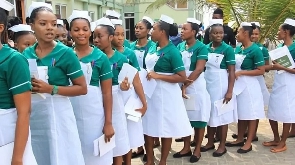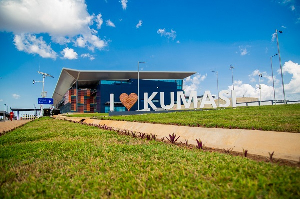The Ministry of Health has initiated steps to develop a migration policy for the healthcare sector in Ghana to address the exodus of healthcare workers, which is threatening quality healthcare delivery and the attainment of sustainable development goals on Universal Health Coverage (UHC).
Ghana has one of the highest rates of healthcare worker migration in Sub-Saharan Africa with over 50% of doctors and 24% of nurses trained in the country now working overseas.
The situation has been worsened by a global shortage of labour in the healthcare sector, particularly in developed countries, since the COVID-19 pandemic.
Speaking at the 2023 Annual Health Sector Policy Dialogue held in Kwahu-Abetifi of the Eastern region, under the theme “The exodus of healthcare workers from Ghana; Implications for skill-mix and network of practice innovations towards achieving UHC”, Deputy Minister of Health, Tina Gifty Naa Ayele Mensah in a speech read on behalf of the Health Minister Kwaku Agyemang Manu said, the ministry is cognizant of the negative consequences of large migration of healthcare workers on quality healthcare and achievement of universal health coverage, and the economy at large, therefore, government has initiated various incentives including improved condition of service and working conditions as well, providing various package for professional development opportunities for healthcare workers for career development to help retain the available human resources.”
Additionally, she stated that the skill gap analysis has been conducted and data has been forwarded to the Ministry of Finance for issuance of clearance for the replacement of healthcare workers lost to other countries in Europe.
“The ministry has conducted skilled gap analysis as the basis for investing some of the limited resources to augment the skills that are in short supply. Currently, the ministry, in collaboration with WHO, is concluding a health labour market analysis to establish the needs, supply, and demand observation to establish whether or not there is equilibrium. In the area of salary, the government has increased the salaries of health workers in recent years. The Ministry is to forward data on separated staff, including migrants, to the Ministry of Finance for replacement since we have a stock of unemployed health professionals,” the health minister said.
The Ministry believes a migration policy will ensure ethical recruitment practices and for bilateral arrangements that will help mitigate the impact.
“Though it is the right for individual health workers to migrate, the worry is medical recruiters who take huge sums of money from the potential Ghanaian migrants who eventually end up not obtaining the right placement in their destination to practice his or her skills.
The ministry is working with international partners to promote ethical recruitment practices among foreign employers of health workers to ensure that Ghanaian health workers are not exploited or mistreated when they work overseas.”
She continued that “the Ministry is partnering with international organizations such as WHO to develop a framework on migration. The document will form the basis for bilateral engagement. MoH is also working to address the root cause of health worker migration such as poverty and unemployment”.
The Country Director of WHO, Dr. Francis Chisaka Kasolo, cautioned that if the current rate of migration of health workers in Ghana is not checked, the country is not likely to achieve universal health coverage.
He therefore said WHO and Ministry of Health have conducted a Health labour market Analysis to establish labour migration strategy for Ghana to among other things ensure skills leaving the country are replaced timely.
Perpetual Ofori-Ampofo, President of the Ghana Registered Midwives and Nurses Association (GRNMA) stressed that developing a migration Policy will provide policy direction to address the migration challenges in the healthcare sector and give requisite guidelines for bilateral benefits from the exodus of healthcare workers from Ghana.
“When you look at our migration Policy in Ghana we have the bigger one but we don’t have one specifically for health and it is important that we have that so that it guides us it gives us the requisite guidelines as to the training, how if we want to export how do we do it. If we earn any resources from that kind of bilateral arrangement how do we apply that resource to also enhance training again, the infrastructure the workforce, and all of that, that is what I am looking forward to”.
The annual Policy dialogue will also explore o options for reforms; skill-mix innovations and implementation of the concept of a network of practice for primary healthcare in Ghana at the sub–district levels by Ghana Health Service.
Health News of Wednesday, 27 September 2023
Source: starrfm.com.gh
Ghana may miss UHC over healthcare workers’ migration – WHO
Entertainment
















